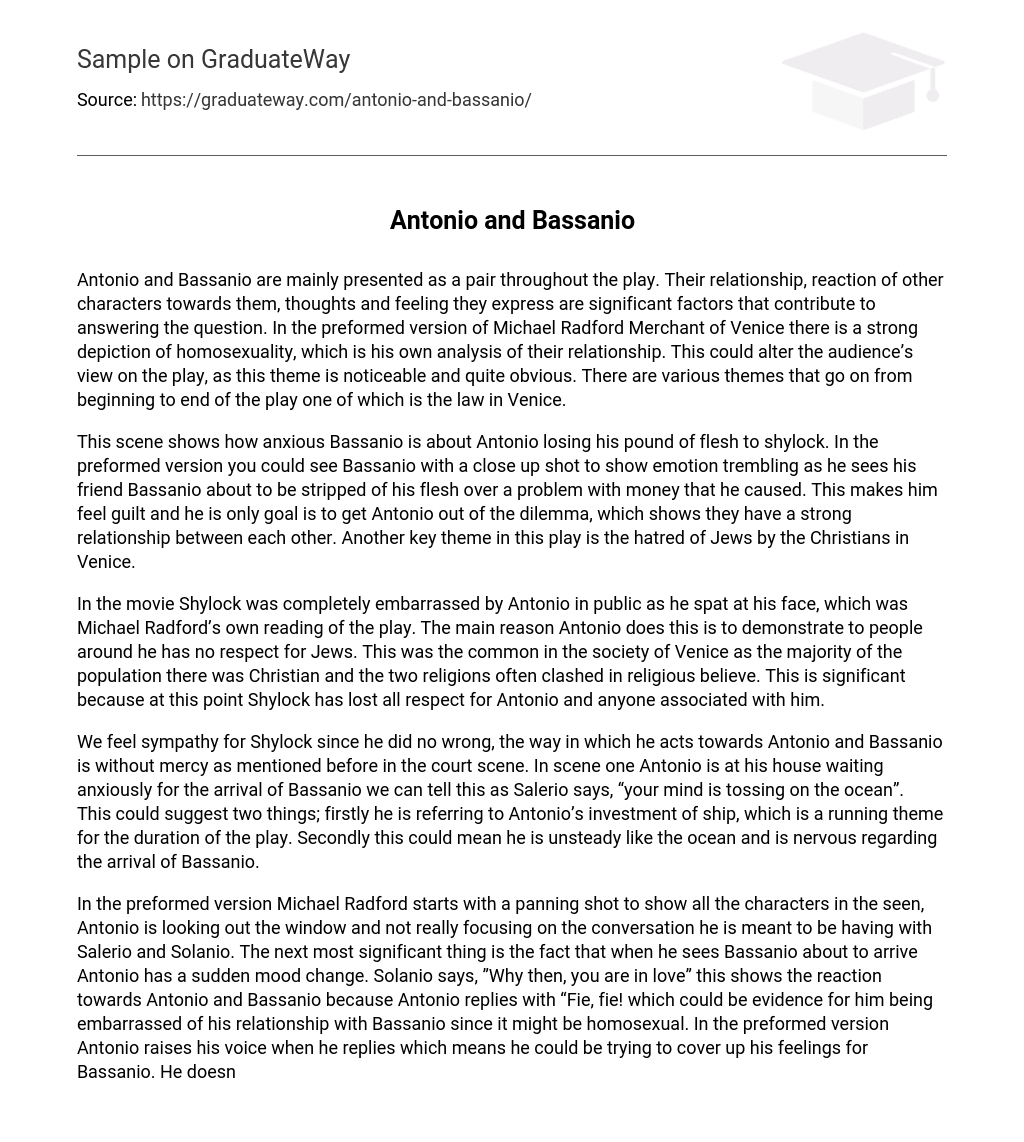Antonio and Bassanio are portrayed as a close duo in the play, influencing how other characters perceive them and revealing their thoughts and emotions. In Michael Radford’s production of The Merchant of Venice, he emphasizes a homosexual interpretation of their relationship, potentially shaping the audience’s understanding of the play. This prominent theme may alter the viewers’ perspective due to its noticeable presence. Additionally, the play explores several themes, including the role of law in Venice, which persists throughout the story.
In this scene, Bassanio’s anxiety about Antonio losing his pound of flesh to Shylock is portrayed. In the performed version, a close-up shot of Bassanio shows his trembling emotions as he witnesses his friend’s imminent loss of flesh due to a financial problem he caused. This guilt-ridden moment highlights Bassanio’s sole goal of rescuing Antonio from this dilemma, thus emphasizing their strong relationship. Additionally, the play explores the prevailing theme of Christians in Venice harboring deep-seated hatred towards Jews.
Shylock, in the movie, experienced great humiliation when Antonio spat at his face in public. This interpretation by Michael Radford highlights the disdain Antonio holds for Jews. This act of disrespect towards Shylock was a common occurrence in Venetian society, where the clash between Christianity and Judaism frequently disrupted religious harmony. This event holds importance because it signifies the complete loss of respect Shylock had for Antonio and anyone connected to him.
Despite Shylock being innocent, his behavior towards Antonio and Bassanio in the court scene is merciless, evoking sympathy from us. In the first scene, we see Antonio anxiously waiting for Bassanio’s arrival at his house, as indicated by Salerio’s remark that “your mind is tossing on the ocean”. This can be interpreted in two ways: it alludes to Antonio’s investment in a ship, which is a recurring motif throughout the play, and it also suggests his unease and nervousness about Bassanio’s arrival.
In the preformed version, Michael Radford begins with a panning shot that reveals all the characters in the scene. Antonio, however, seems distracted as he gazes out the window instead of engaging in conversation with Salerio and Solanio. Antonio’s mood suddenly changes when he notices Bassanio approaching. This shift is significant. Solanio remarks, “Why then, you are in love,” suggesting that there may be a romantic relationship between Antonio and Bassanio, potentially of a homosexual nature. Antonio reacts with embarrassment, exclaiming “Fie, fie!” His raised voice implies a desire to conceal his true feelings for Bassanio. Antonio seems intent on keeping their relationship a secret and dismisses the notion that he has any romantic interest in Bassanio, despite Solanio’s insinuations. When Bassanio finally arrives, he rushes up the stairs as if eager to see Antonio, further indicating the strength of their relationship.
Bassanio hastily climbs the stairs and has a hurried talk with Salerio, indicating his urgency to meet Antonio. Solanio remarks, “we leave you now in better company,” signifying his respect for them and his desire not to intrude on their meeting. It also suggests that Antonio and Bassanio are of a higher rank than Solanio and that he does not want to overstay his welcome. Gratiano remains with Antonio and Bassanio, but when Bassanio throws a glove at him in the film, it prompts Gratiano to leave, as they desire privacy.
In this scene, an important action takes place – the kiss between Antonio and Bassanio. Director Michael Radford decided to include this in his film because he felt that there could be a homosexual aspect to William Shakespeare’s play. To depict the intimacy of the moment, the director utilizes a close up shot. Through this kiss, Antonio and Bassanio express their love for each other. They chose to keep this affectionate moment a secret by being alone in a room and ensuring that everyone else was absent, allowing them privacy.
Antonio’s overreaction to Solanio suggesting that they might be in love can possibly be attributed to the underlying implication of homosexuality in the scene, with Bassanio and Antonio conversing in a bedroom. As they both settle onto the bed and engage in conversation, this action could symbolize their comfort and familiarity with each other or hint at a possible romantic relationship. This display of ease between them serves as evidence of a strong bond and the ability to relax in each other’s presence. Additionally, their discussion centers around marriage, but primarily focuses on financial considerations, leading them to bring up Portia.
Bassanio’s desire to marry Portia seems driven more by her social standing and wealth rather than love, and this suggests a superficiality in their relationship. Antonio also supports this notion. Furthermore, the fact that Bassanio needed money at the time and Antonio was willing to provide it demonstrates a level of trust and love between them. Antonio went out of his way to help Bassanio, despite not having any money at the time. In fact, Bassanio acknowledges that he owes Antonio both financially and emotionally, highlighting that Antonio doesn’t really mind about the money owed.
In summary, this quote suggests that there is a gay relationship occurring, indicating Antonio views Bassanio as family or a close friend. Through the characters of Antonio and Bassanio, we gain insight into the society of Venice and Michael Radford’s interpretation hints at their homosexuality.
Antonio and Bassanio share a unique bond that can be seen as superficial, as they prioritize wealth and status when it comes to marriage. Initially, Antonio is depicted as a depressed character, but with the arrival of Bassanio, he transforms into a powerful and esteemed man in Venice. Throughout the play, they are constantly seen together, emphasizing the special and unparalleled nature of their relationship in The Merchant of Venice.





